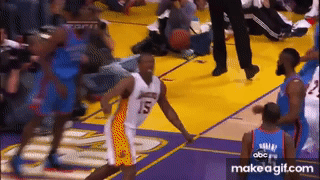
The Game
Foul
A foul is a violation of the rules that typically involves illegal physical contact or unsportsmanlike behavior. Fouls result in various penalties, such as free throws or possession of the ball.
- Personal Foul – Illegal physical contact with an opponent. They include:
- Blocking: Illegal contact that impedes the progress of an opponent.
- Charging: Offensive player runs into a defender who has established position.
- Reaching In: Defender makes contact with the ball handler while attempting to steal the ball.
- Holding: Grabbing or holding an opponent.
- Pushing: Using hands or body to push an opponent.
- Shooting Foul – a personal foul committed against a player who is in the act of shooting. The fouled player is awarded free throws. The number of free throws depends on the type of shot attempted:
- Two free throws for a missed two-point field goal attempt.
- Three free throws for a missed three-point field goal attempt.
- One free throw if the shot is made, in addition to the points scored.
- Technical Foul – a non-contact foul related to unsportsmanlike conduct, violations of decorum, or administrative infractions. The opposing team is awarded one or two free throws and possession of the ball. They include
- Arguing with referees.
- Taunting or inappropriate language.
- Delay of game.
- Illegal use of equipment.
- Flagrant Foul – Excessive or violent contact that could injure an opponent. The opposing team is awarded free throws and possession of the ball. They include:
- Flagrant 1: Unnecessary contact.
- Flagrant 2: Unnecessary and excessive contact, often leading to ejection.
- Intentional Foul – a deliberate foul committed to stop the clock or prevent an easy score. The fouled player is awarded free throws and the fouled team retains possession of the ball.
- Team Fouls – The total number of fouls committed by a team in a given period (quarter or half).
- Bonus Situation – When a team exceeds a certain number of team fouls (usually 5 or more in a quarter or 7 in a half), the opposing team is awarded free throws for non-shooting fouls. This is often referred to as the “bonus” or “penalty” situation.
